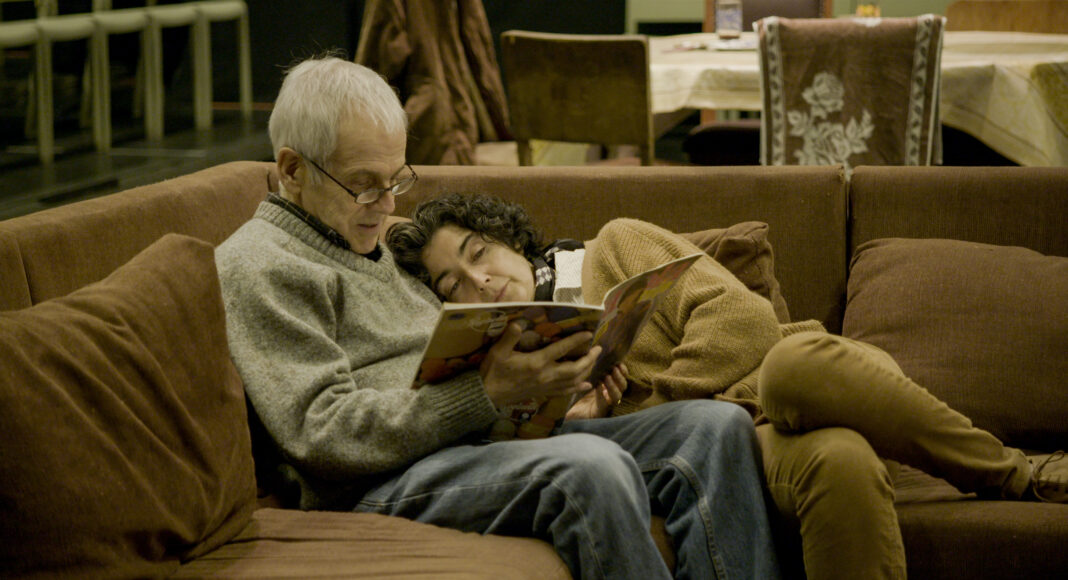Maite Alberdi’s work has been characterized by its profound character exploration, often delving into the complexities of relationships and creating a deeply empathetic connection between the audience and the individuals on screen. Films such as El Salvavidas (The Lifeguard), La Once (Tea Time), and her Oscar-nominated feature El Agente Topo (The Mole Agent) have firmly established the Chilean filmmaker as a leading voice in the world of documentary filmmaking. Her latest documentary, The Eternal Memory, is no exception – through a mix of archive footage and a tender observational lens, the film delicately navigates the heartbreaking journey of a couple grappling with Alzheimer’s.
The Eternal Memory will be screened in UK cinemas from Nov 10.
A blurry camera lens sets the scene, gifting the audience a beautiful and heartbreaking moment. Augusto Góngora awakens, feeling disoriented. With boundless patience and love, Paulina begins to tell him about his life story. ‘I’m here to help you to remember’, she gently reassures him. ‘I am Augusto Góngora’, he responds, as if reciting something he knows by heart. ‘You know who I am?’, asks Paulina. ‘I am Pauli.’ ‘Pauli…’ repeats Augusto and smiles. The intimacy of the moment is captured through the poetic blurred lens, providing an air of haziness to the entire interaction, much like Augusto’s own memories, which are slowly fading away.
It’s an ongoing love story that started over 20 years ago. Paulina’s approach involves tenderly probing their shared history – their first date, their house, the memories that linger. Augusto and Paulina aren’t your everyday Chilean couple. They’re well-known and cherished by many Chileans. Augusto Góngora is a prominent figure in Chilean journalism, having been part of the clandestine broadcasts during the Pinochet dictatorship. Paulina Urrutia, his wife, is a renowned actress and former culture minister during the first government of President Michelle Bachelet. Their history carries an extra layer of complexity as their individual memories become intertwined with the collective memory of a nation.
Their history carries an extra layer of complexity as their individual memories become intertwined with the collective memory of a nation.
This year marks the 50th anniversary of Pinochet’s coup in Chile and the scars of a wounded nation grappling with trauma continue to affect its people to this day. Archive footage of Augusto’s time as a journalist shows him in the thick of tumultuous events, capturing history as it unfolded, and providing a stark reminder of the sacrifices made to document the truth.
In a poignant moment, Augusto and Paulina sit down to revisit his old archive footage amidst the backdrop of his advancing illness. It becomes painfully evident that the images from his past, the atrocities, the loss of lives, and the crimes committed by the dictatorship, still haunt him. ‘Do you remember José Manuel?’, asks Paulina. ‘José Manuel Parada? Of course!’, responds Augusto swiftly. The Degollados case, involving José Manuel, a Chilean sociologist who was abducted and murdered by Carabineros in Santiago during the military dictatorship of Pinochet, evidently stirs strong emotions within him. ‘But we won’, Augusto says. His life’s work, crucial in reporting the truth during a dictatorship, now carries an even deeper emotional weight as he, a journalist who helped to preserve the memory of a nation, battles with his own fading memory.
Even though Alzheimer is rarely mentioned within the film, it becomes clear that we follow a rapidly advancing illness. From moments of clarity to moments of frustration where Augusto sheds tears and appears truly adrift, this love story must weather it all.
Paulina’s composure is remarkable; her patience with Góngora seldom wavers, though a heart-wrenching moment emerges when Augusto starts to forget her and she fears he may never return from that place of forgetfulness. Paulina is aware that this day will inevitably come, the day when Augusto’s mind will be lost forever.
There is lots of humor though, much like life itself. During a solar eclipse they both admire, Paulina playfully turns Augusto around, suggesting that the sun’s rays might give his brain a little boost—after all, who knows? The two of them burst into uncontrollable laughter.
Chilean filmmaker Maite Alberdi is well-acquainted with the challenges of the third age. Through a variety of touching testimonials, her films, including Tea Time, The Mole Agent, and the co-directed short film I’m not from here, delicately depict the intricacies of growing older in a world that can be both harsh and isolating. Yet, they unfailingly uncover moments of humor and life-affirming scenes.
The Eternal Memory is all about embracing life’s little joys. It shows Augusto riding a bike, a couple dancing to love songs, and simply enjoying life while it lasts. At its heart, the film is a simple love story. Filmed over four years, even in the midst of a pandemic, this beautifully shot documentary bears witness to a couple’s journey. Their affection persists, even as memories fade, revealing a love that stands strong.
The Eternal Memory will be screened in UK cinemas from Nov 10.


